小学生一般疑问句
小学生句式转换练习题
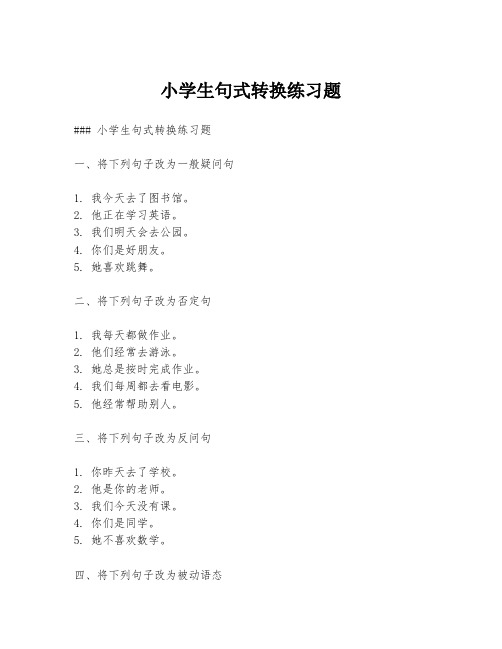
小学生句式转换练习题### 小学生句式转换练习题一、将下列句子改为一般疑问句1. 我今天去了图书馆。
2. 他正在学习英语。
3. 我们明天会去公园。
4. 你们是好朋友。
5. 她喜欢跳舞。
二、将下列句子改为否定句1. 我每天都做作业。
2. 他们经常去游泳。
3. 她总是按时完成作业。
4. 我们每周都去看电影。
5. 他经常帮助别人。
三、将下列句子改为反问句1. 你昨天去了学校。
2. 他是你的老师。
3. 我们今天没有课。
4. 你们是同学。
5. 她不喜欢数学。
四、将下列句子改为被动语态1. 学生们正在打扫教室。
2. 老师布置了作业。
3. 我们经常帮助老人。
4. 他昨天被老师表扬了。
5. 这本书被我借走了。
五、将下列句子改为条件状语从句1. 如果你明天有空,我们去看电影。
2. 只有当他完成作业,他才能看电视。
3. 如果她努力学习,她就能取得好成绩。
4. 我们只有在周末才能去游泳。
5. 他只有通过努力才能实现梦想。
六、将下列句子改为原因状语从句1. 因为天气好,我们去野餐了。
2. 他没有来学校,因为他生病了。
3. 我们提前完成了任务,因为大家都很努力。
4. 她没有参加聚会,因为她有其他安排。
5. 他每天锻炼,因为他想保持健康。
七、将下列句子改为结果状语从句1. 他跑得太快了,以至于没有人能追上他。
2. 她学习得太晚了,结果第二天上课时很困。
3. 他们工作得太努力了,结果提前完成了项目。
4. 他练习得太多,结果在比赛中赢得了第一名。
5. 她准备得太充分了,结果考试得了满分。
八、将下列句子改为让步状语从句1. 尽管他很努力,但他还是没能通过考试。
2. 即使她很累,她还是坚持完成了工作。
3. 虽然他年纪大了,但他仍然保持着年轻的心态。
4. 尽管天气很冷,我们还是决定去徒步旅行。
5. 即使他失败了,他也没有放弃追求梦想。
九、将下列句子改为并列句1. 我喜欢吃苹果,也喜欢吃香蕉。
2. 他喜欢读书,也喜欢听音乐。
3. 我们喜欢去海边,也喜欢去山区。
小学英语语法句型归纳总结

小学英语语法句型归纳总结英语作为一门国际语言,学习英语语法对于小学生来说是至关重要的。
掌握英语语法句型,不仅能够帮助学生更好地理解英语的用法,还能够提高他们的英语表达能力。
下面是对小学英语语法句型的归纳总结:一、简单句型1. 主语 + 动词(及物或不及物)例如:- I eat an apple.(我吃一个苹果。
)- They run in the park.(他们在公园里跑。
)2. 主语 + 动词 + 宾语例如:- She reads a book.(她读一本书。
)- Tom throws a ball.(汤姆扔一个球。
)3. 主语 + 系动词(be动词)+ 表语例如:- I am a student.(我是一个学生。
)- The flower is beautiful.(这朵花很漂亮。
)4. 主语 + 系动词(be动词)+ 地点例如:- The book is on the table.(书在桌子上。
)- The cat is under the chair.(猫在椅子下面。
)二、疑问句1. 一般疑问句使用助动词do、does或did加在句子的主语前,然后再加上动词原形。
例如:- Do you like ice cream?(你喜欢冰淇淋吗?)- Does he play basketball?(他打篮球吗?)2. 特殊疑问句特殊疑问句是用来询问特定信息或细节的问句,通常以疑问代词开头。
例如:- What is your name?(你叫什么名字?)- When is your birthday?(你的生日是什么时候?)- Where do you live?(你住在哪里?)在句子前面加上否定词,通常为don't、doesn't或didn't。
例如:- I don't like pizza.(我不喜欢披萨。
)- He doesn't have a pet.(他没有宠物。
小学生英语句型转换练习题

小学生英语句型转换练习题### 小学英语句型转换练习题题目一:一般疑问句转换1. 原句:I am a student.- 转换:Are you a student?2. 原句:She has a cat.- 转换:Does she have a cat?3. 原句:They play soccer on weekends.- 转换:Do they play soccer on weekends?题目二:特殊疑问句转换1. 原句:My father works in a bank.- 转换:Where does your father work?2. 原句:We usually have lunch at twelve.- 转换:What time do you usually have lunch?3. 原句:The new movie is very interesting.- 转换:How is the new movie?题目三:否定句转换1. 原句:I like apples.- 转换:I don't like apples.2. 原句:She can swim.- 转换:She can't swim.3. 原句:They are at home.- 转换:They are not at home.题目四:陈述句转换为一般疑问句1. 原句:The cat is under the table.- 转换:Is the cat under the table?2. 原句:He is doing his homework.- 转换:Is he doing his homework?3. 原句:We are going to the park tomorrow.- 转换:Are you going to the park tomorrow? 题目五:陈述句转换为否定句1. 原句:She watches TV every evening.- 转换:She doesn't watch TV every evening.2. 原句:They are playing basketball.- 转换:They are not playing basketball.3. 原句:I have a new book.- 转换:I don't have a new book.题目六:反意疑问句1. 原句:He is a good student, isn't he?- 转换:He isn't a good student, is he?2. 原句:She can speak English, can't she?- 转换:She can't speak English, can she?3. 原句:They are going to the concert, aren't they?- 转换:They aren't going to the concert, are they?题目七:被动语态转换1. 原句:We make the cake.- 转换:The cake is made by us.2. 原句:They clean the room.- 转换:The room is cleaned by them.3. 原句:She writes a letter.- 转换:A letter is written by her.题目八:条件句转换1. 原句:If it rains, we will stay at home.- 转换:We will stay at home if it rains.2. 原句:If she has time, she will help us.- 转换:She will help us if she has time.3. 原句:If they finish their homework, they can go out. - 转换:They can go out if they finish their homework.通过这些练习题,小学生可以更好地掌握英语句型的转换,提高语言运用的灵活性和准确性。
三年级英语一般疑问句试题答案及解析

三年级英语一般疑问句试题答案及解析1.从右栏中找出左栏的答语,将序号填在括号内。
(15分)(1)Who’s this? A It’s Li Shan’s skirt.(2)Whose skirt is it? B They are Kitty’s socks.(3)Whose socks are these? C This is my mother.(4)What’s this? D This is a pen.(5)Is this your sweater? E No,it isn’t.【解析】略2.根据问句选答语。
(15分)(1)Is this the face? A No,they aren’t.(2)Does it have nose? B Yes,I do.(3)Are these the eyes? C Yes,it Does.(4)Do you have two hands? D Yes,it is.(5)Does the rabbit have ears? E Yes,it does.【解析】略3. I like the red boots.(一般疑问句)the red boots?【解析】略4. ---______ your jacket? --- Yes.A. Is thisB. It isC. This is【解析】略5.—Is he your father?—____________A.No,he is. B.Yes,he is. C.Really?【答案】B【解析】略6.—________—Yes,I do.A.Do you go swimming? B.Are you swimming?【答案】A【解析】略7.—Are you in the box?—____________A.Yes,I am. B.Yes,I can. C.Yes,I do.【答案】A【解析】略8. ______you like oranges?A.Do B.Have【答案】A【解析】略9. Is she strict?---____________A. She's our principal.B. No, she's kind.C. She is a teacher.10. Is this the school? Yes, _______.A. it isB. It isC. it isn’t【答案】A【解析】略11. Can you see a tiger, Peter? _________.A. Yes, I can.B. Yes, he can.C. Yes, he see.【解析】略12.在B栏中找出A 栏句子的对应句子。
小学英语重点知识点的总结
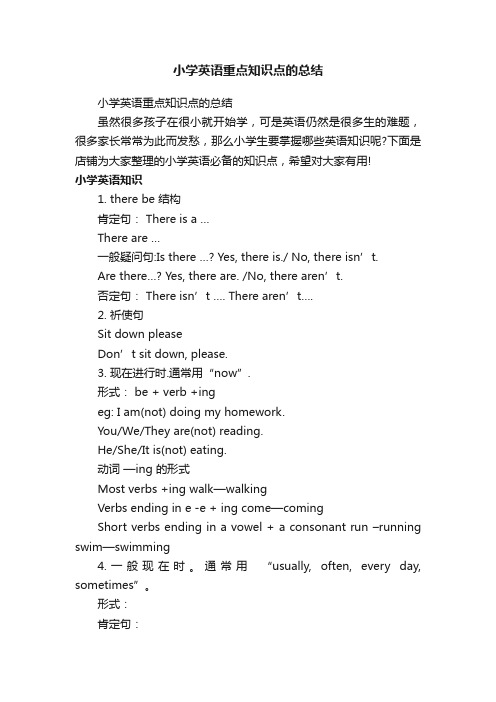
小学英语重点知识点的总结小学英语重点知识点的总结虽然很多孩子在很小就开始学,可是英语仍然是很多生的难题,很多家长常常为此而发愁,那么小学生要掌握哪些英语知识呢?下面是店铺为大家整理的小学英语必备的知识点,希望对大家有用!小学英语知识1. there be 结构肯定句:There is a …There are …一般疑问句:Is there …? Yes, there is./ No, there isn’t.Are there…? Yes, there are. /No, there aren’t.否定句:There isn’t …. There aren’t….2. 祈使句Sit down pleaseDon’t sit down, please.3. 现在进行时.通常用“now”.形式: be + verb +ingeg: I am(not) doing my homework.You/We/They are(not) reading.He/She/It is(not) eating.动词—ing 的形式Most verbs +ing walk—walkingVerbs ending in e -e + ing come—comingShort verbs ending in a vowel + a consonant run –running swim—swimming4.一般现在时。
通常用“usually, often, every day, sometimes”。
形式:肯定句:I go to school on foot every day.She goes to school on foot every day.一般疑问句:Do you jump high? Yes, I do. / No, I don’t.Does he jump high? Yes, he does. / No, he doesn’t.否定句:We don’t go to school on Sundays.My mother doesn’t like watching TV in the evening.5. (情态)动词can,must, should 后面直接用动词原形。
小升初语法汇总(小学生英语语法汇总)
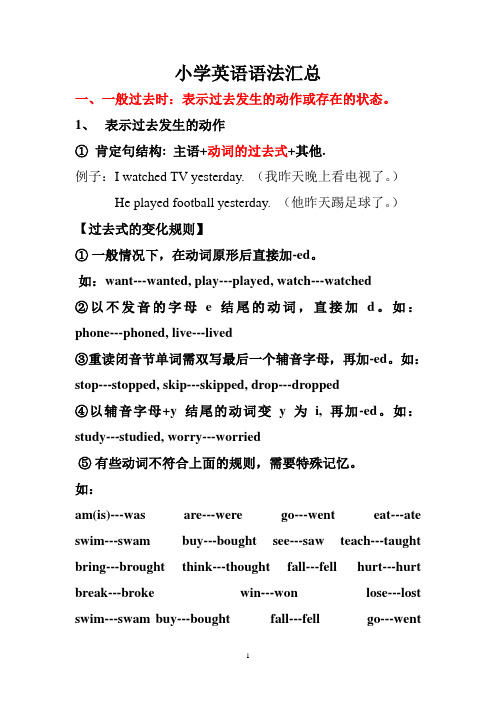
小学英语语法汇总一、一般过去时:表示过去发生的动作或存在的状态。
1、表示过去发生的动作①肯定句结构: 主语+动词的过去式+其他.例子:I watched TV yesterday. (我昨天晚上看电视了。
)He played football yesterday. (他昨天踢足球了。
)【过去式的变化规则】①一般情况下,在动词原形后直接加-ed。
如:want---wanted, play---played, watch---watched②以不发音的字母e结尾的动词,直接加d。
如:phone---phoned, live---lived③重读闭音节单词需双写最后一个辅音字母,再加-ed。
如:stop---stopped, skip---skipped, drop---dropped④以辅音字母+y结尾的动词变y为i, 再加-ed。
如:study---studied, worry---worried⑤有些动词不符合上面的规则,需要特殊记忆。
如:am(is)---was are---were go---went eat---ate swim---swam buy---bought see---saw teach---taught bring---brought think---thought fall---fell hurt---hurt break---broke win---won lose---lost swim---swam buy---bought fall---fell go---wentdo---didread---read come---came have---had bring---brought ride---rode ring---rang fly---flew②否定句结构:主语+didn’t+动词原形+其他.didn’t=did not例子:She didn’t do her homework then. (她那时没有写家庭作业。
小学英语语法知识点归纳小学英语语法知识点汇总
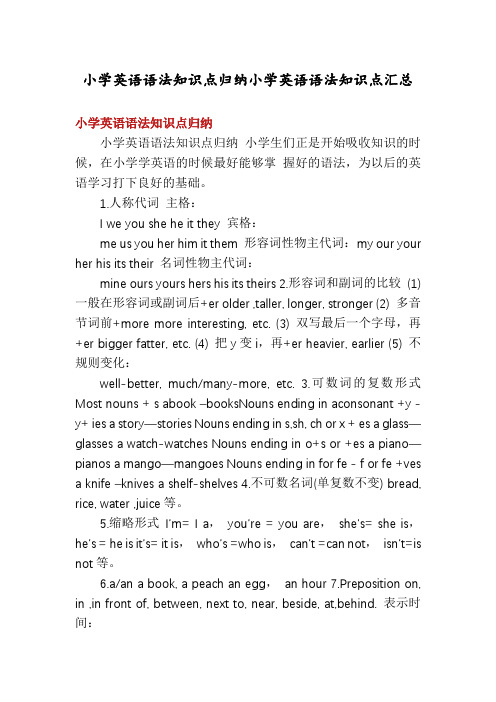
小学英语语法知识点归纳小学英语语法知识点汇总小学英语语法知识点归纳小学英语语法知识点归纳小学生们正是开始吸收知识的时候,在小学学英语的时候最好能够掌握好的语法,为以后的英语学习打下良好的基础。
1.人称代词主格:I we you she he it they 宾格:me us you her him it them 形容词性物主代词:my our your her his its their 名词性物主代词:mine ours yours hers his its theirs 2.形容词和副词的比较(1) 一般在形容词或副词后+er older ,taller, longer, stronger (2) 多音节词前+more more interesting, etc. (3) 双写最后一个字母,再+er bigger fatter, etc. (4) 把y变i,再+er heavier, earlier (5) 不规则变化:well-better, much/many-more, etc. 3.可数词的复数形式Most nouns + s abook –booksNouns ending in aconsonant +y - y+ ies a story—stories Nouns ending in s,sh, ch or x + es a glass—glasses a watch-watches Nouns ending in o+s or +es a piano—pianos a mango—mangoes Nouns ending in for fe - f or fe +ves a knife –knives a shelf-shelves 4.不可数名词(单复数不变) bread, rice, water ,juice等。
5.缩略形式I’m= I a,you’re = you are,she’s= she is,he’s = he is it’s= it is,who’s =who is,can’t =can not,isn’t=is not等。
一般疑问句

用 do 问 (I, they)
• I often watch TV on Sundays. →Do you often watch TV on Sundays? Yes, I do. No, I don't.
I我
1.I like apples. Do you like apples?
2.I like to eat Do you like to eat
Yes, they do. No, they don't.
need 需要
• need to do
I need to do some shopping(购物). 我需要去一些买东西。
2. I need to read books.
我需要看书。
basketball 篮球 listen to music 听音乐
Is that your pencil ? 3、It is my pen.
Is it your pen ? 4、She is six years old(六岁).
Is she six years old? 5、He is a boy. (男孩)
Is he a boy?
Is that a peach?
1.That is a peach.
Is it your ruler?
2.It is my ruler.
Is that an apple?
3.That’s an apple.
Is this your bag?
4.This is your bag.
Is she your teacher ? 5.She is my teacher.
一般疑问句
回答为“是yes”或者“否no”的 问句。
小学英语语法专项练习大全(附答案)

小学生语法专项练习题疑问句练习一.将下列各句改成一般疑问句。
1. Andy is hungry.2. Frank comes from England.3. I can speak English.4. We will go camping tomorrow morning.1. Is Andy hungry?2. Does Frank come from England?3. Can you speak English?4. Will you go camping tomorrow morning?二、提问1、They usually watch TV. (对划线部分提问)______ ______ they usually ______?2) Their teacher told them a story yesterday.(对划线部分提问) _____ _____ their teacher_____them yesterday?3)She is going to listen to music after school.(对划线部分提问) _____ _____ she_____ _____ _____ after school? 4)你们有什么爱好?他喜欢集邮,我喜欢听音乐。
(根据中文填写英文)---What _____ your _____ ? ---He _____ _____ stamps and I like__________to music.1. What do, do2.What did, tell3. What is ,going to do4. are, hobbies,likes collecting, listening2.冠词练习一.在空格内填上a或an1._____ear2.______actor3._____hen4.______toy5.____university6.______ elephant7.______hat8.______umbrella9.______rabbit 10.______idea 11.______hour 12_______ honest boy 13.______interesting book14.______easy question 15.______orange dress16_______X-ray machine 17______ice cream答案1. an2. an3. a4. a5. a6. an 7 a. 8. an 9. a 10. an 11. an 12.an 13 an14. an 15.an 16.an 17 an二.选择填空1.Mom tells her little daughter _____ old story every night.A. aB. /C. anD. the2. ______computer on the table is Susan’s.A. AB. AnC. TheD. /3.There is ______ map of the world on ______wall. ______map is mine.A. a, a, AB. a, the, TheC. the, the, TheD. the, the, A5. ______Spring comes after______winter.A. /, /B.The, /C.The, theD.A, the6.I bought ______shoes yesterday. ______ shoes are very beautiful.A. a, TheB. a pair of, TheC. the, TheD. a pair, The pair7.He was ______ soldier in the Second World War.A. aB. anC. theD. /8.She can play______ and ______.A. the tennis, the guitarB. tennis, guitarC. the tennis, guitarD. tennis, the guitar9.I can see______moon and ______clouds in the sky.A. the, aB. a, aC. the, /D. the, the11. ______Tian’anmen Square is in__Beijing. A. /, / B. A, / C. The, / D. /, the12.—Can you tell me ______nearest bookshop?—Go straight and turn right at_______third crossing, and you willsee it.A. the, aB. the, theC. a, theD. the, /红色为答案。
三年级一般疑问句10个例句
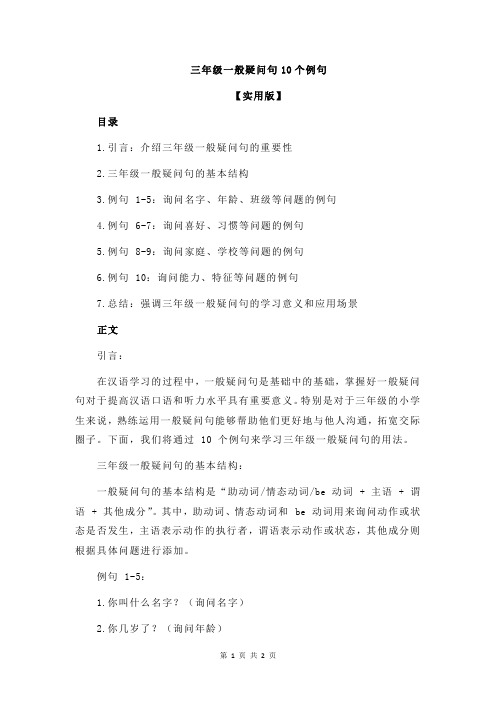
三年级一般疑问句10个例句【实用版】目录1.引言:介绍三年级一般疑问句的重要性2.三年级一般疑问句的基本结构3.例句 1-5:询问名字、年龄、班级等问题的例句4.例句 6-7:询问喜好、习惯等问题的例句5.例句 8-9:询问家庭、学校等问题的例句6.例句 10:询问能力、特征等问题的例句7.总结:强调三年级一般疑问句的学习意义和应用场景正文引言:在汉语学习的过程中,一般疑问句是基础中的基础,掌握好一般疑问句对于提高汉语口语和听力水平具有重要意义。
特别是对于三年级的小学生来说,熟练运用一般疑问句能够帮助他们更好地与他人沟通,拓宽交际圈子。
下面,我们将通过 10 个例句来学习三年级一般疑问句的用法。
三年级一般疑问句的基本结构:一般疑问句的基本结构是“助动词/情态动词/be 动词 + 主语 + 谓语 + 其他成分”。
其中,助动词、情态动词和 be 动词用来询问动作或状态是否发生,主语表示动作的执行者,谓语表示动作或状态,其他成分则根据具体问题进行添加。
例句 1-5:1.你叫什么名字?(询问名字)2.你几岁了?(询问年龄)3.你在哪个班级?(询问班级)4.你喜欢什么?(询问喜好)5.你每天几点睡觉?(询问习惯)例句 6-7:6.你喜欢看书还是喜欢看电视?(询问喜好)7.你会游泳还是跑步?(询问能力)例句 8-9:8.你的家在哪里?(询问家庭住址)9.你的学校离你家远吗?(询问学校距离)例句 10:10.你是一个勇敢的孩子吗?(询问特征)总结:通过以上 10 个例句的学习,我们可以发现,三年级一般疑问句在日常生活和学习中具有广泛的应用。
熟练掌握这些例句,不仅可以提高我们的口语表达能力,还能让我们更好地理解他人的意思。
一般疑问句小学英语练习题
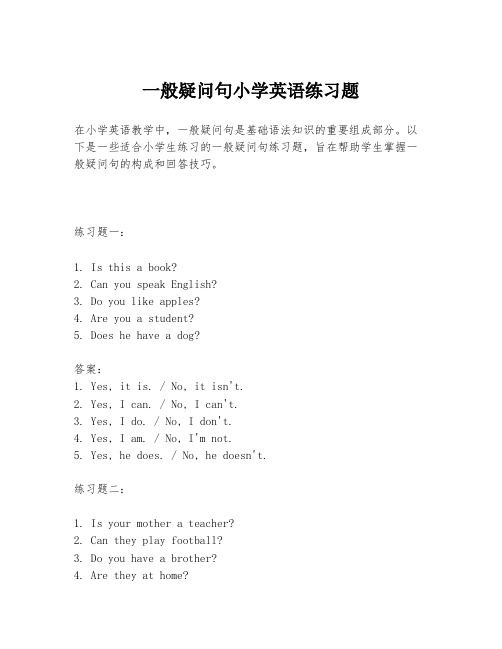
一般疑问句小学英语练习题在小学英语教学中,一般疑问句是基础语法知识的重要组成部分。
以下是一些适合小学生练习的一般疑问句练习题,旨在帮助学生掌握一般疑问句的构成和回答技巧。
练习题一:1. Is this a book?2. Can you speak English?3. Do you like apples?4. Are you a student?5. Does he have a dog?答案:1. Yes, it is. / No, it isn't.2. Yes, I can. / No, I can't.3. Yes, I do. / No, I don't.4. Yes, I am. / No, I'm not.5. Yes, he does. / No, he doesn't.练习题二:1. Is your mother a teacher?2. Can they play football?3. Do you have a brother?4. Are they at home?5. Does she live in China?答案:1. Yes, she is. / No, she isn't.2. Yes, they can. / No, they can't.3. Yes, I do. / No, I don't.4. Yes, they are. / No, they aren't.5. Yes, she does. / No, she doesn't. 练习题三:1. Is it raining?2. Can you swim?3. Do they have a cat?4. Are you hungry?5. Does he like music?答案:1. Yes, it is. / No, it isn't.2. Yes, I can. / No, I can't.3. Yes, they do. / No, they don't.4. Yes, I am. / No, I'm not.5. Yes, he does. / No, he doesn't. 练习题四:1. Is she your sister?2. Can he play the piano?3. Do you have a car?4. Are they in the classroom?5. Does she have long hair?答案:1. Yes, she is. / No, she isn't.2. Yes, he can. / No, he can't.3. Yes, I do. / No, I don't.4. Yes, they are. / No, they aren't.5. Yes, she does. / No, she doesn't.练习题五:1. Is he your friend?2. Can they dance?3. Do you like sports?4. Are you from Beijing?5. Does he have a bike?答案:1. Yes, he is. / No, he isn't.2. Yes, they can. / No, they can't.3. Yes, I do. / No, I don't.4. Yes, I am. / No, I'm not.5. Yes, he does. / No, he doesn't.通过这些练习题,学生可以加深对一般疑问句的理解,并且学会如何正确地构造和回答一般疑问句。
小学英语语法专项肯定句变一般疑问句

一般疑问句: Does she have any bread for lunch today?
肯定回答: Yes, she does.
否定回答:
No, she doesn’t.
Thanks for watching!
小学英语语法专项 肯定句变一般疑句
中文解释什么是一般疑问句
是的,我是。
不,我不是。
你是一名小学生吗?
中文解释什么是一般疑问句
是的,她喜欢。
不,她不喜欢。
她喜欢唱歌吗?
英语中的一般疑问句
一.什么是一般疑问句?
一般疑问句是疑问句的一种。它是一般只用
yes(是)或 no(否)来回答的
句子 。
英语中的一般疑问句
肯定回答:__Y_e_s___, _t_h_e_r_e__a_r_e_. 否定回答:__N_o____, _t_h_e_r_e__a_r_e_n’t.
6. There is some bread on the table.
___Is___ there __a_n_y__ on the table?
肯定回答:___Y_e_s__, _t_h_e_r_e_i_s_.__ 否定回答:___N__o__, _th__e_re__i_s_n_’_t.
_A__r_e_ they _w_a_t_c_h_in_g_ TV now?
肯定回答:__Y_e_s___, __th__e_y_a_r_e_.___ 否定回答:__N_o____, __th__e_y__a_r_e_n_’_t.
例句:
5. There are some books.
_A__re__ there ___a_n_y_ books?
英语中的一般疑问句
小学一般疑问句练习题

小学一般疑问句练习题01. What is your name?My name is Sara.02. Are you a student?Yes, I am a student.03. Can you swim?No, I can't swim.04. Does she like ice cream?Yes, she likes ice cream.05. Is it raining outside?No, it is not raining outside.06. Are they brothers?Yes, they are brothers.07. Did you eat breakfast?Yes, I ate breakfast.08. Is he playing soccer?No, he is not playing soccer.09. Do you have a pet?Yes, I have a pet.10. Are you going to the park?No, I am not going to the park. 11. Did you see the movie?Yes, I saw the movie.12. Is it your birthday today?No, it is not my birthday today. 13. Can you speak French?Yes, I can speak French.14. Is she coming to the party?No, she is not coming to the party.15. Do they have any books?Yes, they have many books. 16. Is he a doctor?No, he is not a doctor.17. Did you go to the zoo?Yes, I went to the zoo.18. Are you wearing a hat?No, I am not wearing a hat.19. Can you play the piano?Yes, I can play the piano.20. Is it snowing?No, it is not snowing.21. Did they finish their homework? Yes, they finished their homework.22. Is she wearing a blue dress?No, she is not wearing a blue dress.23. Do you like pizza?Yes, I like pizza.24. Are you going to the party?No, I am not going to the party. 25. Can you ride a bike?Yes, I can ride a bike.26. Is it your favorite color?No, it is not my favorite color. 27. Did you visit your grandparents? Yes, I visited my grandparents. 28. Is he watching TV?No, he is not watching TV.29. Do you have any siblings?Yes, I have two siblings.30. Are you going to the beach?No, I am not going to the beach.这是一些小学生常见的一般疑问句练习题,通过回答这些问题,可以帮助学生熟悉并练习运用疑问句的语法结构和语调。
小学生常用修改符号之问号与感叹号同时使用说明与举例
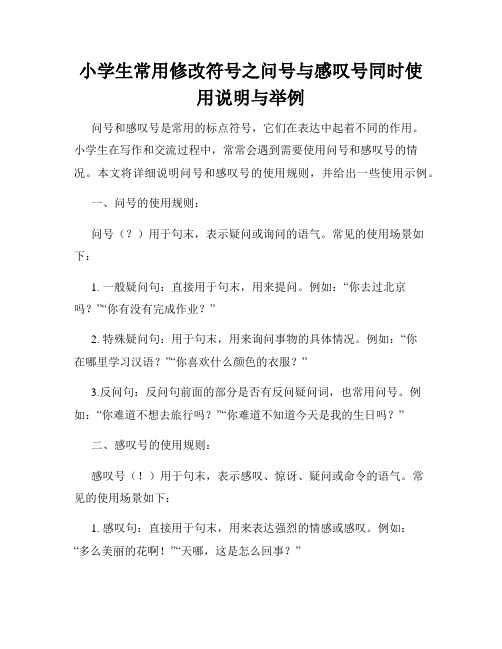
小学生常用修改符号之问号与感叹号同时使用说明与举例问号和感叹号是常用的标点符号,它们在表达中起着不同的作用。
小学生在写作和交流过程中,常常会遇到需要使用问号和感叹号的情况。
本文将详细说明问号和感叹号的使用规则,并给出一些使用示例。
一、问号的使用规则:问号(?)用于句末,表示疑问或询问的语气。
常见的使用场景如下:1. 一般疑问句:直接用于句末,用来提问。
例如:“你去过北京吗?”“你有没有完成作业?”2. 特殊疑问句:用于句末,用来询问事物的具体情况。
例如:“你在哪里学习汉语?”“你喜欢什么颜色的衣服?”3.反问句:反问句前面的部分是否有反问疑问词,也常用问号。
例如:“你难道不想去旅行吗?”“你难道不知道今天是我的生日吗?”二、感叹号的使用规则:感叹号(!)用于句末,表示感叹、惊讶、疑问或命令的语气。
常见的使用场景如下:1. 感叹句:直接用于句末,用来表达强烈的情感或感叹。
例如:“多么美丽的花啊!”“天哪,这是怎么回事?”2. 祈使句:用于句末,表示命令、请求或劝告。
例如:“请你离开!”“喂,给我一杯水!”3. 疑问感叹句:表示疑问和感叹的语气。
例如:“你真的做到了吗?”“这些都是真的吗!”4. 感叹性插入语:用于句中,表示强烈的情感。
例如:“他竟然得了第一名!”“这样的美景,真是太美了!”三、问号和感叹号同时使用的情况:有时候,在表达中,我们需要同时使用问号和感叹号来强调疑问和感叹的情感。
常见的使用情况如下:1. 疑问感叹句:既表达疑问又表达感叹的句子,即同时使用问号和感叹号。
例如:“你这是什么地方?!”“他怎么会做出这样的事情?!”2. 感叹的疑问句:以感叹为主,但带有疑问的语气,可以同时使用问号和感叹号。
例如:“你是怎么做到的?!”“这件事情竟然是真的?!”3. 感叹性陈述句:以感叹为主,但具有陈述的性质,可以同时使用问号和感叹号。
例如:“天哪,你真厉害!”总之,在使用问号和感叹号时,需要根据表达的情感和语气来选择合适的标点符号。
一般疑问句练习题小学生
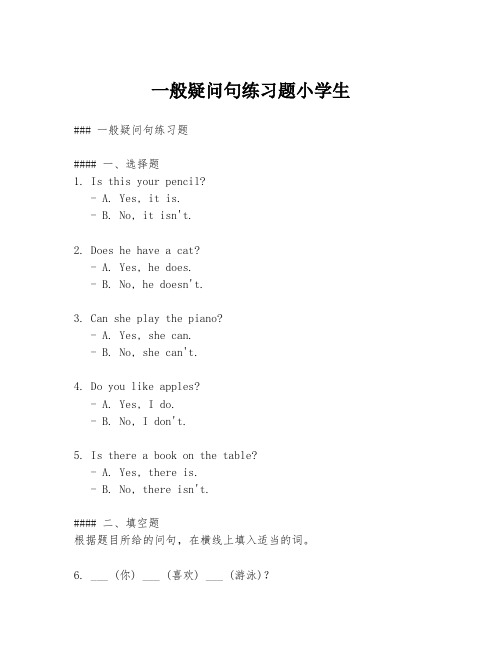
一般疑问句练习题小学生### 一般疑问句练习题#### 一、选择题1. Is this your pencil?- A. Yes, it is.- B. No, it isn't.2. Does he have a cat?- A. Yes, he does.- B. No, he doesn't.3. Can she play the piano?- A. Yes, she can.- B. No, she can't.4. Do you like apples?- A. Yes, I do.- B. No, I don't.5. Is there a book on the table?- A. Yes, there is.- B. No, there isn't.#### 二、填空题根据题目所给的问句,在横线上填入适当的词。
6. ___ (你) ___ (喜欢) ___ (游泳)?- 答案:Do you like swimming?7. ___ (他) ___ (有) ___ (一只狗)?- 答案:Does he have a dog?8. ___ (我) ___ (能) ___ (帮助) ___ (你)?- 答案:Can I help you?9. ___ (他们) ___ (去) ___ (学校) ___ (今天)?- 答案:Do they go to school today?10. ___ (这是) ___ (你的) ___ (书包)?- 答案:Is this your bag?#### 三、改错题找出句子中的错误并进行改正。
11. Does you like ice cream?- 改正:Do you like ice cream?12. Is there a cat and a dog in the house?- 改正:Are there a cat and a dog in the house?13. Can she sings a song?- 改正:Can she sing a song?14. Do you have a lot of books?- 改正:Do you have a lot of books? (原句正确)15. Is there any milk in the fridge?- 改正:Is there any milk in the fridge? (原句正确)#### 四、翻译题将下列中文句子翻译成英文。
is, am, are的一般疑问句
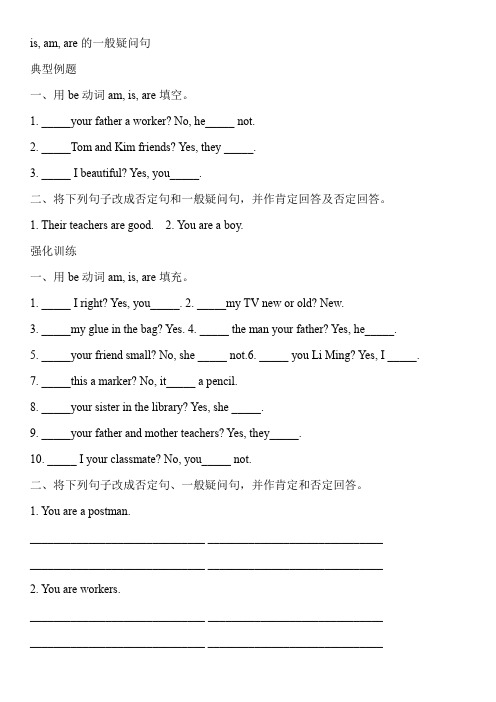
is, am, are的一般疑问句典型例题一、用be动词am, is, are填空。
1. _____your father a worker? No, he_____ not.2. _____Tom and Kim friends? Yes, they _____.3. _____ I beautiful? Yes, you_____.二、将下列句子改成否定句和一般疑问句,并作肯定回答及否定回答。
1. Their teachers are good.2. You are a boy.强化训练一、用be动词am, is, are填充。
1. _____ I right? Yes, you_____.2. _____my TV new or old? New.3. _____my glue in the bag? Yes.4. _____ the man your father? Yes, he_____.5. _____your friend small? No, she _____ not.6. _____ you Li Ming? Yes, I _____.7. _____this a marker? No, it_____ a pencil.8. _____your sister in the library? Yes, she _____.9. _____your father and mother teachers? Yes, they_____.10. _____ I your classmate? No, you_____ not.二、将下列句子改成否定句、一般疑问句,并作肯定和否定回答。
1. You are a postman.______________________________ ____________________________________________________________ ______________________________2. You are workers.______________________________ ____________________________________________________________ ______________________________3. We are in the park.______________________________ ______________________________ ______________________________ ______________________________ 4. Miss Zhang is in the classroom.______________________________ ______________________________ ______________________________ ______________________________ 5. That is your bicycle.______________________________ ______________________________ ______________________________ ______________________________ 6. Their pants are old.______________________________ ______________________________ ______________________________ ______________________________ 7. Tom’s coats are brown.______________________________ ______________________________ ______________________________ ______________________________ 8. This is a blue hat.______________________________ ______________________________ ______________________________ ______________________________三、汉译英。
一年级疑问句的例子10个
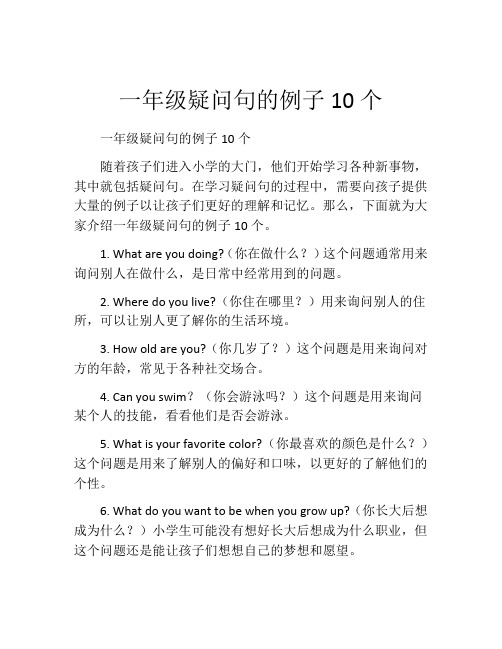
一年级疑问句的例子10个一年级疑问句的例子10个随着孩子们进入小学的大门,他们开始学习各种新事物,其中就包括疑问句。
在学习疑问句的过程中,需要向孩子提供大量的例子以让孩子们更好的理解和记忆。
那么,下面就为大家介绍一年级疑问句的例子10个。
1. What are you doing?(你在做什么?)这个问题通常用来询问别人在做什么,是日常中经常用到的问题。
2. Where do you live?(你住在哪里?)用来询问别人的住所,可以让别人更了解你的生活环境。
3. How old are you?(你几岁了?)这个问题是用来询问对方的年龄,常见于各种社交场合。
4. Can you swim?(你会游泳吗?)这个问题是用来询问某个人的技能,看看他们是否会游泳。
5. What is your favorite color?(你最喜欢的颜色是什么?)这个问题是用来了解别人的偏好和口味,以更好的了解他们的个性。
6. What do you want to be when you grow up?(你长大后想成为什么?)小学生可能没有想好长大后想成为什么职业,但这个问题还是能让孩子们想想自己的梦想和愿望。
7. Why are you sad?(你为什么伤心?)这个问题会让人感觉到关心和温暖,了解自己的情绪和内心。
8. When is your birthday?(你的生日是什么时候?)这个问题是要了解身边的人的生日,有时它也可以成为社交或庆祝活动的一个重要部分。
9. Which is your favorite book?(你最喜欢的书是哪一本?)这个问题是要了解别人喜欢的书,不同的人内心深处会喜欢不同的书。
10. Who is your best friend?(你最好的朋友是谁?)这个问题是用来了解别人最亲密的关系,这也可以帮助孩子们更好的理解人际关系和交友关系。
总结:这些问题包括了孩子熟悉的基本疑问句式,是否能够了解到孩子在生活中遇到的问题并进行回答。
小学英语变一般疑问句的题
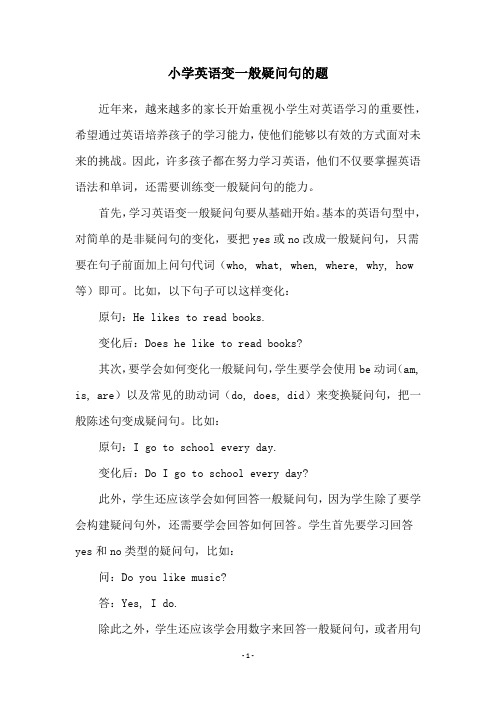
小学英语变一般疑问句的题近年来,越来越多的家长开始重视小学生对英语学习的重要性,希望通过英语培养孩子的学习能力,使他们能够以有效的方式面对未来的挑战。
因此,许多孩子都在努力学习英语,他们不仅要掌握英语语法和单词,还需要训练变一般疑问句的能力。
首先,学习英语变一般疑问句要从基础开始。
基本的英语句型中,对简单的是非疑问句的变化,要把yes或no改成一般疑问句,只需要在句子前面加上问句代词(who, what, when, where, why, how 等)即可。
比如,以下句子可以这样变化:原句:He likes to read books.变化后:Does he like to read books?其次,要学会如何变化一般疑问句,学生要学会使用be动词(am, is, are)以及常见的助动词(do, does, did)来变换疑问句,把一般陈述句变成疑问句。
比如:原句:I go to school every day.变化后:Do I go to school every day?此外,学生还应该学会如何回答一般疑问句,因为学生除了要学会构建疑问句外,还需要学会回答如何回答。
学生首先要学习回答yes和no类型的疑问句,比如:问:Do you like music?答:Yes, I do.除此之外,学生还应该学会用数字来回答一般疑问句,或者用句子中的信息来回答,这样就可以更加深入的了解和表达自己的答案。
比如:问:What time do you usually get up?答:I usually get up at 7 oclock.最后,学习这种技能既是一种学术技能,也是一种语言技能。
因此,学生要多多练习,反复练习,才能更好的掌握英语变一般疑问句的能力。
综上所述,学习英语变一般疑问句是小学英语教学中至关重要的一部分,是孩子们必须掌握的基本技能,它可以帮助孩子们掌握英语的结构,有效地运用英语知识,从而使他们更好地掌握英语,更好地为未来做好准备。
- 1、下载文档前请自行甄别文档内容的完整性,平台不提供额外的编辑、内容补充、找答案等附加服务。
- 2、"仅部分预览"的文档,不可在线预览部分如存在完整性等问题,可反馈申请退款(可完整预览的文档不适用该条件!)。
- 3、如文档侵犯您的权益,请联系客服反馈,我们会尽快为您处理(人工客服工作时间:9:00-18:30)。
小学生一般疑问句 -CAL-FENGHAI-(2020YEAR-YICAI)_JINGBIAN
.
1、定义: 用Yes或No作答的疑问句叫一般疑问句。
第一家族为含be动词或情态动词的一般疑问句,其结构为:
be + 主语 + 其它部分?
情态动词 + 主语 + 动词原形 + 其它部分?
肯定回答用“Yes,主语+be\情态动词.”,否定回答用“No,主语+be\情态动词+not.”。
be或情态动词和not可用缩写形式,主要有isn’t,aren’t,wasn’t,weren’t,can’t,mustn’t,needn’t等。
Eg1.问句: Is this your English book
肯答: Yes,it is.
否答: No,it isn`t.
Eg2.问句: Are these your English books
肯答: Yes,they are.
否答: No,they aren’t.
Eg3.问句: Can you speak English?
肯答: Yes,I can.
否答: No,I can’t.
注意例句1和例句2,在回答时必须将this\that与these\those分别变为it 和they。
另一家族为含行为动词(或称为实义动词)的一般疑问句,其结构为:助动词 + 主语 + 动词原形 + 其它?
肯定回答用“Yes, 主语+ do\does.”,否定回答用“No, 主语+do\does not.”。
助动词也常用缩写形式,主要有don’t,doesn’t,didn’t等。
Eg4. 问句: Do your parents like English
肯答: Yes,they do.
否答: No,they don’t. [1]
将陈述句变为一般疑问句
根据一般疑问句不同的家族,可以用不同的方法将陈述句变为相应的一般疑问句。
1、第一家族:含be动词或情态动词的句子
秘诀:
一调二改三问号
一调:即把句中的be或情态动词调到主语前;
二改:改换主语称谓,即将句中的主语I\my\mine\we\our\ours等第一人称分别改为相应的第二人称you\your\ yours等;
三问号:句末的句号改为问号。
如:
Eg6. I am an English teacher. → Are you an English t eacher?
Eg7. We can speak English fluently. → Can you speak English fluently?
2、第二家族:含行为动词(或称为实义动词)的句子
秘诀:
一加二改三问号
一加:即在句首加助动词Do或Does;
二改:1、把谓语动词改为原形;2、改换主语称谓(同第一家族);
三问号:句末的句号改为问号。
Eg8. We read English every morning. → Do you read English every mornin g?
Eg9. Tom’s father listens to English on the radio every evening. →
Does Tom’s father listen to English on the radio every evening?
特别注意:对于第二家族一定要注意动词的还原,因为时态与数的变化已经体现在助动词上了。
[1]
注意
编辑
“some”还是“any”
在一般疑问句中,要表达“一些”时,一般用any,但如果这个问句是用来表达“建议、请求、邀请”等交际功能时,应该用some.
Eg10. Is there any tea in the cup?
Eg11. Do you have any children?
Eg12. May I have some fish?
Eg13. Would you like some tea?
Eg14. Shall we buy some vegetables?
Eg15. Can I borrow some money from you?
Eg16. Why not have some bread?
Eg17. How about some orange juice?
小学英语一般疑问句和否定句的口诀
(一) 有can有be,can、be提前
(二)没有can、be的,do、does显身手,三单用does,does后动词还原
(三)其他人称do在前提前没can没be其他人称do在前
否定句口诀:
一)有can有be,can、be后面not添
二)没有can、be、do、does显身手,单三用doesn’t,doesn’t后面动还原
三)其他人称don’t动词前
练习
1. My father is a doctor.(变否定句)
2. These cats are crying. (一般疑问句)
3. They can swim.
一般疑问句__________________________
肯定回答:_________________________
否定回答:__________________________
4 .Mrs Li and kitty can sing English songs(一般疑问句)
5 .I have many friend.
一般疑问句___________________
肯定回答:________________________
否定回答:____________________________
6.His father is a English teacher.
一般疑问句:_______________________________
否定回答:_________________________________
肯定回答:_________________________________
7.I go to school by foot.
一般疑问句__________________
否定句:_____________________
8. He likes English.
一般疑问句:__________________________________.
肯定回答:_____________
否定回答:___________________
9 .He wants to a cup of coffee.
一般疑问句____________________
肯定回答;__________________
否定回答:_______________________
10.I do my homework after school.
一般疑问句_______________________
否定句:_______________________________。
